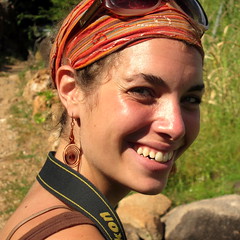Not that I sought one out. (Then again, neither do I ask for the marriage proposals.) But when a white male friend, Maarten, was enlisted by a coworker for an ad campaign, a woman at the modeling agency asked if he could recruit a pal. The requirements: female (check), white (we’ve established this), tall (I’m barely 5’4”, but I still tower over many Malawians), beautiful (you be the judge).
For me, the main draw of the campaign, a series of ads for a countrywide hotel chain, was the free upmarket lodging. I would get to spend one night at a woodsy inn perched high on a plateau and another on the shores of Lake Malawi. I packed my entire (highly limited) closet — let them decide what I should wear, I figured — and embarked on this new career.

“America’s Next Top Model” it was not. On the first day, one of the models didn’t show, so the young women from the modeling agency scoured a nearby college campus for a replacement. Because they were off searching for our mystery model, the photographer’s assistant took over hair and makeup. “You don’t have any makeup?” she asked. “Not even lip gloss?” I shook my head. She slathered me with Vaseline.
Maarten and I posed together for the first photo. “Couple, smart casual, taking food from buffet,” the plan read. My “smart casual” comprised a 12-year-old dress, which I think I wore to a cousin’s Bat Mitzvah, and the $7 secondhand wedges I’d found at the market the day before. The buffet was a dessert spread, with distractingly labeled “raspberry fruits” and cheesecake with a Barbie pink glaze. Maarten and I took turns serving. “Rebecca, smile at the chocolate cake,” the photographer, Arjen, instructed. “Smile at the cake. Now smile at Maarten. No, close your mouth. No, I don’t want any teeth. Ah, ok. Now back to the cake. Smile at the cake. Smile at the cake. Smile at the cake. Beautiful.”
We were a difficult duo. Arjen kept imploring us to take it seriously, something I found difficult to do when he also instructed us to “Love the place, love the food, love each other, love everything.” To get into the scene, Maarten and I tried creating a narrative (we were a young married couple; this was our second wedding anniversary), but it quickly devolved (I was anxious about kids; I didn’t like his tie; each thought the other had grown tubby since the nuptials). I’m sure Arjen was relieved to release us once mystery model arrived.
We had another shot in the late afternoon, though: “Couple, casual clothes, looking in the distance.” It turns out looking into the distance is a real challenge. What do you do with your hands? Do you stand with legs akimbo? Or maybe one leg crossed over the other? How do you conjure up an expression of awe when the only sight around is a red “FIRE ASSEMBLY POINT” sign? “Don’t overplay,” Arjen repeated, wearier each time. “Especially you, Rebecca. Don’t overplay.”
I finally relaxed for my third and final shoot: “Two models having lunch on terrace.” We were on the lake by this time, and I had a whole fish on my plate (I poked its gluey eye with my fork; Arjen promptly reprimanded me). This was the first multiracial photo — I was paired with Aubrey, a radio journalist. We toasted glasses of wine (well, ginger ale) and held our silverware awkwardly. But conversation flowed (whenever you learn how to say “to bite” in a foreign language, you know banter has been lively) and Arjen said we looked glamorous. His assistant swore I had improved.


“So Rebecca, how did you get into modeling?” mystery model Chloe asked. I explained I’d never modeled before.“Oh, that’s always how it starts,” she responded, nodding knowingly.
Somehow, I don’t think so.












